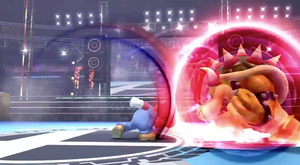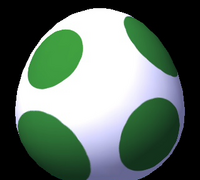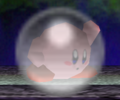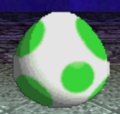Shield: Difference between revisions
No edit summary Tag: Mobile edit |
mNo edit summary |
||
| Line 51: | Line 51: | ||
When holding their shield, characters do not have all the same options as they do while standing, but they are still able to use many moves. A character can [[roll]] to reposition themselves while retaining [[invincibility frame|invincibility]]. If a player predicts that the enemy will grab to penetrate their shield, they can quickly [[sidestep]] to avoid the grab (''[[Melee]]'' and ''[[Brawl]]'' only). | When holding their shield, characters do not have all the same options as they do while standing, but they are still able to use many moves. A character can [[roll]] to reposition themselves while retaining [[invincibility frame|invincibility]]. If a player predicts that the enemy will grab to penetrate their shield, they can quickly [[sidestep]] to avoid the grab (''[[Melee]]'' and ''[[Brawl]]'' only). | ||
Characters can also [[grab]] and [[jump]] out of their shield. Grabbing after blocking an attack is a prevalent technique known as [[shield grab]]bing - it allows one to quickly retaliate against an enemy attacker. Jumping from the shield allows characters to immediately [[short hop fast fall l-cancel| | Characters can also [[grab]] and [[jump]] out of their shield. Grabbing after blocking an attack is a prevalent technique known as [[shield grab]]bing - it allows one to quickly retaliate against an enemy attacker. Jumping from the shield allows characters to immediately [[short hop fast fall l-cancel|SHFFL]], [[wavedash]] or [[jump-canceling|jump-cancel]] into their [[up smash]] or [[up special move]]. All these offensive and defensive options make shielding the centerpiece to a player's defensive game. | ||
Similar to the [[dash-cancel]], characters can activate their shield while dashing, resulting in a short slide from the momentum. A character can also dash toward an opponent, feigning a rush, and then shield; the opponent may fall for the feint and try to retaliate, leaving him or her open to the rusher's real attack. | Similar to the [[dash-cancel]], characters can activate their shield while dashing, resulting in a short slide from the momentum. A character can also dash toward an opponent, feigning a rush, and then shield; the opponent may fall for the feint and try to retaliate, leaving him or her open to the rusher's real attack. | ||
Revision as of 14:38, November 17, 2014
- For other uses of "shield", see Shield (disambiguation)
- "Shield break" redirects here. For Marth's and Lucina's neutral special move, see Shield Breaker.

A shield (sometimes known as guard by certain technical processes) is a bubble of energy encircling the user that blocks all attacks with the exception for grabs, Final Smashes, and other unblockable attacks. One raises the shield by pressing a shield button (Z in Super Smash Bros., L or R in Melee, Brawl, and SSB4) while standing on the ground. Shields cannot be held forever; they shrink as time passes and attacks are blocked, and break when held for too long and will do a shield jump (popping the user into the air before stunning them). Shields recharge when not in use. The colour of a shield is based on the team colour of the user - when not in a team battle, shields are red for player 1, blue for player 2, yellow for player 3, green for player 4, and grey for computer players. Player 4's shield is grey just as the computer players' shield in Super Smash Bros.. In Brawl, when an attack hits a shield, a bit of the shield shatters and pieces of the shield can be seen flying. If the control stick is tilted slightly, the shield can be shifted to help block attacks from specific directions.
Technical details
Though the shield blocks most attacks without fail and comes out instantly, their shrinking causes them to not always cover the character's entire damageable collision bubble - thus, the user is still vulnerable to shield stabbing.
Shields are considered to be both aerial and grounded; therefore they can be struck by both aerial-only and by grounded-only hitboxes.
If a projectile hits a shield at just the right angle, it will be deflected, rather than blocked. The initial raising of the shield creates a small energy wave; if that wave hits a projectile, it will be reflected.
When shielding in Melee, one can adjust the depression of the L or R button to alter the density of the shield. A light shield will cover a wider area and shrink more slowly than a dense shield, but the user will skid back a larger distance when hit. If one uses the Z button to shield, the shield will be maximum size, however this shield will take a bit longer to put up, as the character will try to grab first. Variable shield density was removed from Brawl, presumably because it can only be used with a GameCube controller or the original Wii Classic Controller (no other controller has analog buttons).
If a shield is fully raised and encircles an incoming attack (in Melee), or a shield is raised 4 frames before an attack hits (in Brawl), the attack will be powershielded.
It is possible to move while using a shield. This is called a dashing shield.
Certain attacks have increased shield damage, meaning that they deal more damage to shields than to other targets. The Fan is one example, whose smash attack can break a shield in one hit. On the other hand, some attacks deal reduced damage to shields; this is exclusive to certain strong attacks in Smash 64 such as the Hammer.
| Max HP | Depletion per sec. | Regeneration per sec. | Reset when broken | |
|---|---|---|---|---|
| SSB64 | 55 | 3.75 | 6 | 30 |
| Melee | 60 * | 8.4 | 4.2 | 30 |
| Brawl | 50 * | 16.8 | 4.2 | 30 |
| * Takes 30% less damage from attacks. Additional shield damage is not reduced in this way. It is unknown if other shields have this behaviour. | ||||
The comparatively strong shields in Smash 64 may be tied into the reason as to why said game's throws are rather powerful; having strong throws would discourage players from overusing their powerful shields. Furthermore, if an attack hits a shield in SSB64, any throws done out of a subsequent shield grab will only do half damage, reducing viable out-of-shield options.
Shield breaking
Each character has a shield with a particular size and strength. With each hit inflicted within a period of time, the shield will diminish until it is broken. This results in the character being thrown into the air, and being stunned for a few moments after landing. Stun time is dependent on damage; characters with more damage will be stunned for less time. This phenomenon is known as a shield break.
The purpose of a shield breaking is, along with grabbing, to prevent a player from staying in his or her shield indefinitely. Instead, the shield will get smaller and smaller, exposing more of the character to attack until the entire shield is depleted. Shield breaking moves are either ones that can be comboed to prevent a character from rolling out or from dropping the shield without being hit or ones that deal enough shield damage to break the shield in one hit. Certain moves, like Marth's fully charged Shield Breaker, will break most shields in one hit. The items Fan and Mr. Saturn are also very effective shield breakers as well.
If a character's shield breaks while at the very edge of a stage, the possibility of the character being stunned until falling into a KO can occur. The knockback of some moves when breaking the shield transfers to the opponent, thus pushing the character with the broken shield off the edge.
Players who use Jigglypuff should be especially careful about its shield breaking. Like other characters, if Jigglypuff's shield breaks, Jigglypuff will fly upward and then be stunned for a short period of time. Unlike other characters, however, Jigglypuff flies several hundred times farther upward than normal. This is well enough to KO Jigglypuff, unless there is a ceiling or some other obstacle preventing it from flying straight up.
Options from the shield
When holding their shield, characters do not have all the same options as they do while standing, but they are still able to use many moves. A character can roll to reposition themselves while retaining invincibility. If a player predicts that the enemy will grab to penetrate their shield, they can quickly sidestep to avoid the grab (Melee and Brawl only).
Characters can also grab and jump out of their shield. Grabbing after blocking an attack is a prevalent technique known as shield grabbing - it allows one to quickly retaliate against an enemy attacker. Jumping from the shield allows characters to immediately SHFFL, wavedash or jump-cancel into their up smash or up special move. All these offensive and defensive options make shielding the centerpiece to a player's defensive game.
Similar to the dash-cancel, characters can activate their shield while dashing, resulting in a short slide from the momentum. A character can also dash toward an opponent, feigning a rush, and then shield; the opponent may fall for the feint and try to retaliate, leaving him or her open to the rusher's real attack.
Character-specific
Yoshi's shield

Yoshi has a different shield from that of other characters'. Instead of using a bubble, he uses an egg for protection. This egg does not shrink, preventing any attempts at shield stabbing. Instead, as it weakens, the egg darkens from white to dark red (similar to the color of the percentage meters). The egg prevents Yoshi from jumping out of his shield in Melee and Brawl and glide tossing in Brawl, but when lightshielding, Yoshi will slide a huge distance when attacked (possibly across the entire stage). Also, Yoshi has been known to randomly perfect shield (not completely understood), and is also invincible during his shielding animation. Given the fact that Yoshi cannot jump out of his shield in Melee and Brawl, in addition to his shieldgrab being slow, his out of shield game is much more limited than the rest of the cast, resulting in much more difficulty dealing with inclose pressure.
Jigglypuff's shield
While having a very large shield compared to its size, Jigglypuff's shield can cause devastating effects for the user if broken. Its leap - the force it is sent upwards with if its shield breaks - is equivalent to taking 10,000 units of knockback, which is four times the maximum knockback capable of being done by an attack. If nothing stops it, Jigglypuff will self-destruct. This phenomenon is known as the Shield Jump and it can be helpful in some areas such as the Brinstar Escape Shaft in Melee's Adventure Mode and The Glacial Peak in the Subspace Emissary.
Origin
The concept of blocking attacks is a standard amongst the fighting game genre. In traditional fighting games, blocking involves characters bracing against attacks (such as by holding up their arms), which typically prevents the character from flinching or being affected by any of the attack's effects or gimmicks. Blocked attacks still deal minimal damage, and blocking too many attacks can break the character's guard and leave them vulnerable. Many fighting games require players to choose between blocking high or low attacks and does not allow players to block grabs or attacks from behind.
In Kirby Super Star, Kirby is capable of blocking attacks in effectively the exact same way as traditional fighting games - protecting him from flinching or losing his ability while still dealing minor damage if the attack is strong enough - though he automatically guards from all directions. In addition, if Kirby has the Mirror ability, guarding produces a multi-coloured bubble around his body that blocks all non-grab attacks without chip damage and is even capable of reflecting certain projectiles. It is this bubble that appears to be the inspiration for the shield bubble in the Super Smash Bros. series.
Yoshi's shield design, on the other hand, is possibly based on an occurrence in Yoshi's Island. When Baby Mario grabs a Super Star and starts running around, Yoshi follows by hiding in an egg and becoming part of his egg trail. The duo is invincible during this time. The shield may also be based on Yoshi becoming invincible once swallowing a Turbo Tulip in Yoshi's Story, although that is generally attributed to the Egg Roll instead. It is unknown why Yoshi is the only character to have a unique shield.
Gallery
A CPU Kirby shielding in Smash 64.
Captain Falcon angling his shield upwards in Smash 64
Yoshi's shield in SSB64.
Mario's shielding animation in Melee.
Mario's shield stun animation in Melee.
Zero Suit Samus shields to defend herself against Snake's attack.










